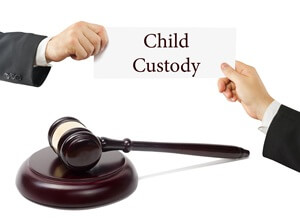Physical vs. Legal Custody & Visitation In Arlington
Physical vs. Legal Custody & Visitation In Arlington
Overview:
In Arlington, custody falls into two types: physical custody, which determines where a child lives, and legal custody, which determines who makes important decisions about the child’s life. Courts base arrangements on the child’s best interests, weighing stability, well‑being, and strong parent‑child relationships. These decisions shape visitation rights and require careful planning. The Irving Law Firm can help protect your rights and create an arrangement that supports your child’s future.
Custody and visitation decisions are some of the most important choices parents face after a divorce. These arrangements shape where a child will live, who will make important decisions about their life, and how each parent will remain involved. In Arlington, custody is divided into two main types: physical custody and legal custody.
Here, you’ll learn how these types of custody work and the ways they affect visitation rights. This is essential to create a plan that protects a child’s well-being and supports healthy co-parenting. With the right knowledge, parents can approach the process with clarity, confidence, and a focus on their child’s best interests.
Custody In Arlington: What Every Parent Should Know
Child custody determines how parents share the rights and responsibilities of raising their children. It covers two main areas: physical custody, which is where the child lives, and legal custody, which decides who makes important decisions about their upbringing, such as education, healthcare, and religion.
In Virginia, custody decisions are always based on the best interests of the child. Courts look at factors such as the child’s emotional and physical needs, each parent’s ability to provide a stable home, and the importance of maintaining strong relationships with both parents. These decisions can have a lasting impact on a child’s development, making thoughtful arrangements essential.
Custody may be joint, with responsibilities shared between parents, or sole, where one parent takes the primary role. Each type affects parenting time, decision-making authority, and the role each parent plays in the child’s daily life. Understanding these distinctions helps parents make informed choices that protect their child’s well-being and maintain healthy family relationships.
The Difference Between Physical & Legal Custody
Custody arrangements center on two forms: physical custody and legal custody. Understanding how each works helps parents determine responsibilities, make informed decisions, and create a plan that supports their child’s well-being.
Rights & Responsibilities
Physical custody pertains to the child’s daily living arrangements, covering how and where they spend their time. The parent ensures the child’s immediate needs are met. Legal custody, on the other hand, allows a parent the authority to decide about their child’s life, such as education, healthcare, and religion.
Custody Options: Sole Or Joint
Physical custody can be sole or joint. Sole means one parent is primarily responsible for the child’s care, while the other parent may have visitation rights. In contrast, joint custody allows both to share time with the child, ensuring that they have significant relationships with both.
Similarly, legal custody can also be sole or joint: One parent has the right to make all major decisions for the child, or both must agree on significant decisions. Regardless of the choice, it should encourage communication and cooperation.
Impact On Parenting
Physical custody influences the child’s daily environment and overall stability. The custodian parent plays a crucial role in creating routines, setting boundaries, and fostering a sense of security for the child.
Alternatively, legal custody shapes the level of cooperation required between parents. It can impact how parents interact, especially when making decisions about the child’s schooling, healthcare, and future.
Courts Consideration
When deciding custody, courts review a range of factors to ensure the arrangement serves the child’s best interests. For physical custody, judges consider the child’s emotional needs, overall well-being, and each parent’s living situation to ensure stability. A child’s preferences may also be taken into account, depending on their age and maturity.
For legal custody, the court evaluates each parent’s ability to communicate, cooperate, and make important decisions together. The child’s emotional and psychological needs remain a central focus throughout the process.
Regardless of the type of custody, parents must foster a supportive environment. Custody decisions can also influence visitation arrangements, so it is important to approach these choices thoughtfully.
The Impacts Of Custody On Visitation
Visitation rights determine how noncustodial parents can spend time with their children. It allows both of them to keep active and involved in their child’s life. Here are some of the arrangements available in Virginia:
- Scheduled Visitation: Regular, predictable time with the child based on a set schedule.
- Supervised Visitation: A third party must be present during visits, often due to concerns about safety or well-being.
- Virtual Visitation: Allows for communication through technology, such as video calls, in some instances where in-person visits are impossible.
Visitation rights provide opportunities for bonding and shared experiences. So, parents must adhere to the schedule to foster these connections. However, there are common pitfalls when navigating these arrangements. It complicates relationships and undermines the benefits. Awareness about these issues can help you avoid them.
Addressing Common Pitfalls During The Process
Navigating arrangements can be challenging for parents because of the legal nuances. Understanding the potential pitfalls can help them avoid common mistakes that might negatively affect their children’s well-being. Awareness of these issues allows parents to approach the process more effectively.
Misunderstanding Custody Terms
Confusion about custody terms can cause tension between parents. A parent may assume they have more decision-making power than granted, leading to disputes over parenting plans or visitation. Such misunderstandings can harm the child’s emotional well-being and strain family relationships. Clear communication and a proper understanding of custody terms help prevent these issues.
Failing To Prioritize The Child’s Best Interests
When parents put their own preferences ahead of their child’s needs, the results can be damaging. Disputes over custody that disrupt a child’s routine or stability often ignore what is truly in the child’s best interests. Overlooking emotional factors can leave children feeling caught in the middle, leading to stress, anxiety, or behavioral problems. Over time, this can weaken the parent‑child bond and hinder healthy development.
This can be avoided by focusing on the child’s needs before making custody decisions. Maintaining consistent routines, encouraging strong relationships with both parents, and setting aside personal conflicts all help protect the child’s well‑being. Seeking mediation or legal guidance can also keep discussions constructive and centered on the child’s best interests.
Inadequate Preparation For Court Hearings
Thorough preparation is critical for a successful custody hearing. Parents should be ready with key documentation, such as financial records, parenting schedules, and communication logs, to show their ability to provide a stable and supportive environment.
Without proper preparation, parents risk unfavorable custody or visitation outcomes that can affect the child’s well-being. Working with a child custody lawyer can help avoid these pitfalls. They can guide you through the legal process, ensure you present the strongest possible case, and keep the focus on the child’s best interests.
Benefit From The Support Of Family Law Attorneys

- Explaining custody laws and procedures so parents fully understand their rights, responsibilities, and available options.
- Guiding parents through the legal process to avoid mistakes and ensure compliance with Virginia’s custody requirements.
- Advocating for parental rights during negotiations, mediation, and court hearings to pursue favorable custody and visitation outcomes.
- Developing effective parenting plans that address custody arrangements, visitation schedules, and decision-making responsibilities while prioritizing the child’s well-being.
- Providing objective advice to keep discussions productive and focused, especially in emotionally charged situations.
With the guidance of a skilled family law attorney, parents can approach custody and visitation decisions with clarity and confidence. The right lawyer protects your rights while keeping the focus on your child’s stability, well-being, and future. Having strong legal support can turn a difficult process into a clear plan that works for both parents and supports the child’s needs.
Trusted Legal Support For Custody & Visitation Matters
Custody and visitation matters can be complex and emotionally challenging, which is why having skilled legal guidance is so important. Our attorneys at The Irving Law Firm create personalized strategies designed to protect your parental rights and promote your child’s well-being. We take the time to understand your situation, listen to your concerns, and develop solutions that reflect your family’s unique needs.
Whether through mediation, negotiation, or courtroom advocacy, we provide steady guidance at every stage of the process. Clear communication and strong advocacy are at the heart of our approach, helping you work toward an arrangement that offers stability for your child and peace of mind for you. Choosing the right attorney can make all the difference, so contact The Irving Law Firm today to learn how we can help you move forward with confidence.





